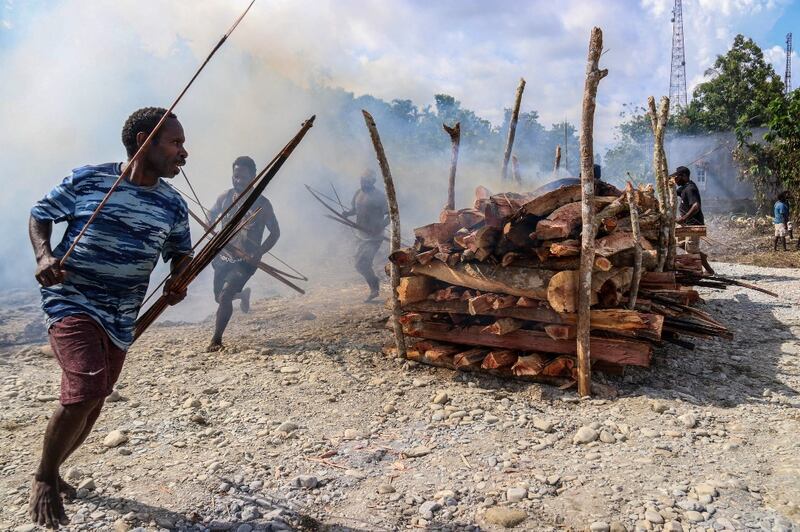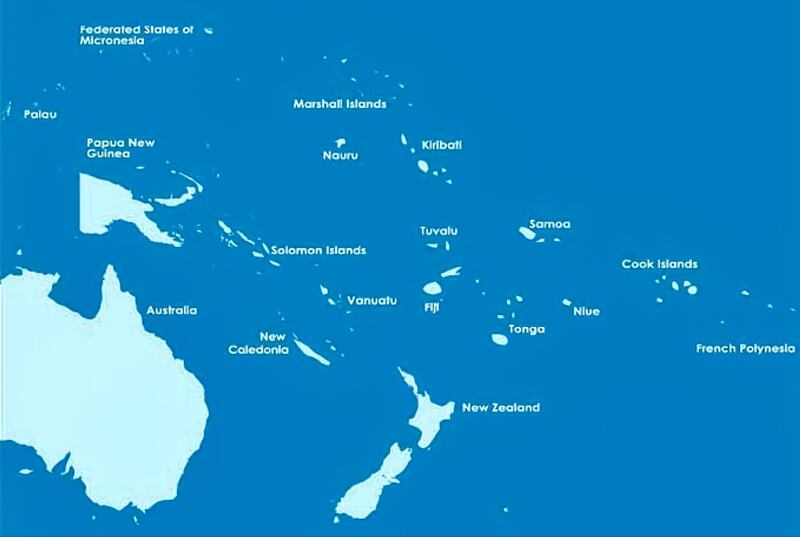Pacific island nations have tempered their protests against Indonesia’s rule in its volatile Papua region, a possible sign that Jakarta’s effort to silence some of its most vocal critics has gained traction, analysts say.
In 2016, at least half a dozen Pacific island nations used the United Nations General Assembly to call attention to human rights abuses and what they described as systematic discrimination against indigenous Melanesians in the easternmost provinces of Indonesia. Some backed calls for self-determination.
They kept up a drumbeat of criticism for several years, in particular Vanuatu, a predominantly Melanesian nation where there is broad support for Papuan independence from Indonesia.
But this year only the Marshall Islands mentioned Indonesia’s Papuan provinces, with a brief reference to a Pacific regional organization’s longstanding call for Indonesia to admit a U.N. human rights delegation.
“It is mostly a demonstration of Indonesia’s growing influence,” said Tarcisius Kabutaulaka, associate professor in Pacific studies at the University of Hawai’i. “Jakarta has been quite successful in taking the West Papua issue off the agenda.”
The dialing down of criticism has occurred at a time when the Papuan independence movement in Indonesia has been completely eclipsed in the news by the COVID-19 pandemic, Russia’s invasion of Ukraine and rivalry between China and the United States in the Pacific.
On the ground, the armed elements of the independence movement have stepped up lethal attacks on Indonesian security forces, civilians and targets such as construction of a trans-Papua highway that would make the Papuan highlands more accessible to outsiders. Peaceful protests against Indonesia’s rule and abuses by Indonesia’s military and police remain frequent.

The conflict has simmered since the early 1960s when Indonesia took control of the western half of New Guinea island from the Netherlands. Indonesian rule was formalized in 1969 with a vote under U.N. auspices that involved little more than 1,000 Papuans handpicked and closely managed by Indonesia.
Administratively, Jakarta has divided the region into provinces, but it remains widely known as West Papua.
Indonesia’s government refers to independence fighters as criminal gangs and has consistently denied human rights abuses; it also denies foreign observers and journalists access to its Papua provinces. Amnesty International says Indonesian security forces unlawfully killed nearly 100 people in the Papuan region between 2010 and 2018.
Softened Pacific criticism of Indonesia could be a sign of “growing awareness that the negative campaign on Papua is just propaganda for a small group of Papuans living abroad," said Indonesian Foreign Ministry spokesman Teuku Faizasyah.
The Pacific Islands Forum, a regional organization of Pacific island nations as well as New Zealand and Australia, didn’t mention West Papua in communiques from its annual meetings this year or last year.
When the forum released an aspirational masterplan in July for the Pacific’s development, its map of the Pacific had lopped off the Indonesian half of New Guinea. It was an accurate depiction of the forum’s member countries, but angered some Papuan activists.
The map was “institutional discrimination” against Papuans across the entire New Guinea island, activist Ronny Kareni said on Twitter. “This is messed up and the lowest for such a blueprint.”

Indonesia has stepped up its diplomacy with Pacific nations for several years through humanitarian aid and attempts at closer relations.
In 2015, it got observer status in the Melanesian Spearhead Group, a regional organization of Melanesian nations in which the umbrella organization for West Papuan independence activists is also an observer.
Indonesia unveiled a “Pacific Elevation” policy in 2019, which involves portraying itself as a Pacific nation on the basis that a minority of its population is Melanesian.
State-owned Indonesian company PT Wijaya Karya this year completed a U.S. $7.5 million complex for futsal and other sports in the Solomon Islands capital that’s a key part of the country’s hosting of the 2023 Pacific Games. Solomons Prime Minister Manasseh Sogavare has asked Indonesia to build two more futsal complexes in other provinces.
Kabutaulaka, at the University of Hawai’i, said Sogavare is now “absolutely silent” on West Papua. Previously he was very outspoken and took leadership of the Pacific Coalition of West Papua – which grouped together some Pacific countries, the West Papua independence movement and other organizations – when it was formed in 2016, Kabutaulaka said.
“In the case of the Solomons,” said Matthew Wale, leader of the opposition in the Solomon Islands parliament, “the donation of a futsal stadium has effectively compromised its voice.”
Researcher Hipolitus Wangge at Australian National University said the Pacific Games assistance, money for the Melanesian Spearhead Group secretariat based in Vanuatu’s capital, and a regional security working group initiated and facilitated by Indonesian police are examples of Indonesia shaping the way Pacific countries respond to Papua issues.
Indonesia’s aid to Pacific island countries totaled about U.S. $17 million between 2014 and 2020, most of it to Fiji, and just a fraction of the estimated U.S. $2.0 billion of assistance the region receives annually, according to Wangge and Stephanie Lawson, at Macquarie University, in a 2021 paper.
Indonesia’s efforts to influence Pacific governments don’t affect grassroots support for Papuan independence, Wangge and Lawson said.
The default Indonesian government response to legitimate criticism of its role in the conflict remains indignation, cover ups and an “almost mindless repetition of the mantra of state sovereignty and non-interference,” they said.
Meanwhile, Vanuatu, which may have a change of government after a snap election later this month, could become more critical again, said Baiq Wardhani, a Pacific scholar at Airlangga University in Surabaya.
This year the Indonesian foreign ministry established a directorate for the Pacific, according to Shofwan Al Banna Choiruzzad, international relations lecturer at the University of Indonesia. But there are limits to what its current approach can achieve, he said.
“Strong diplomacy can only be realized if Indonesia can convince the Indonesian people and the international community that Indonesia is committed to resolving the Papua issue in a fair and civilized manner,” said Shofwan.
Benny Wenda, acting chairman of the United Liberation Movement for West Papua, said its push for full membership in the Melanesian Spearhead Group was interrupted by the pandemic but continues.
“Soon we will be reconnected there with our Melanesian family,” said Wenda, who lives in exile in the United Kingdom.
Pizaro Gozali Idrus and Tria Dianti in Jakarta contributed to this report.
